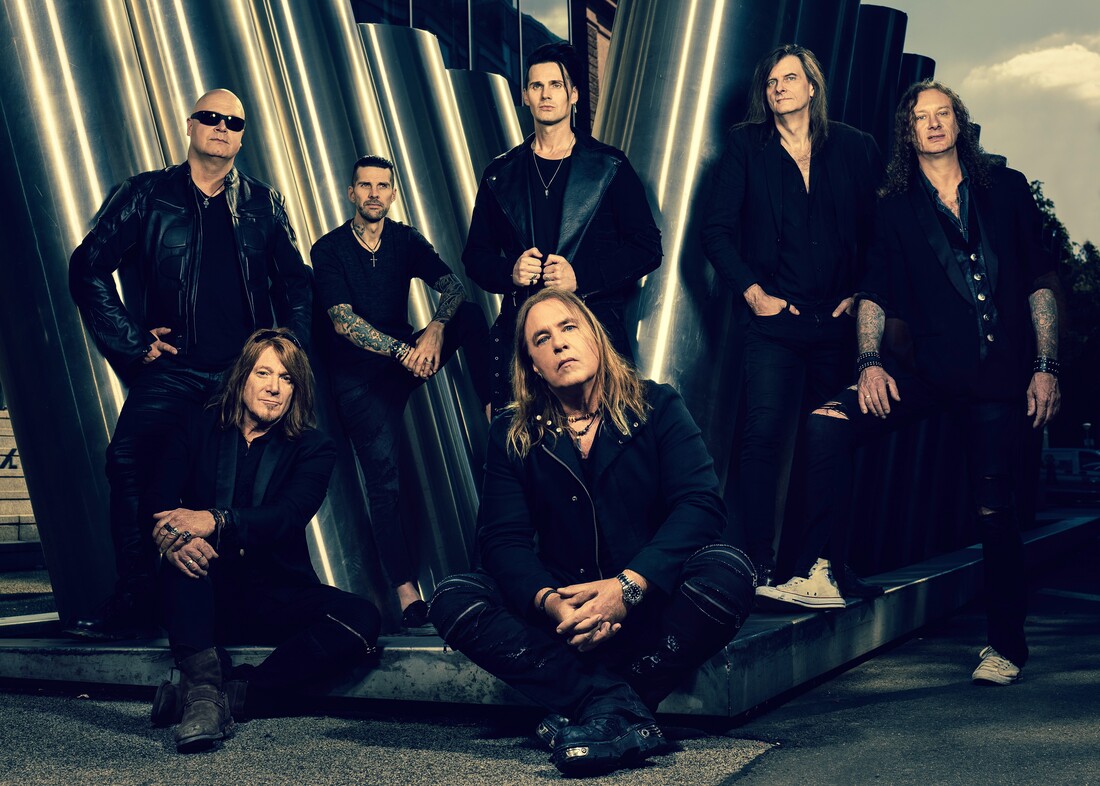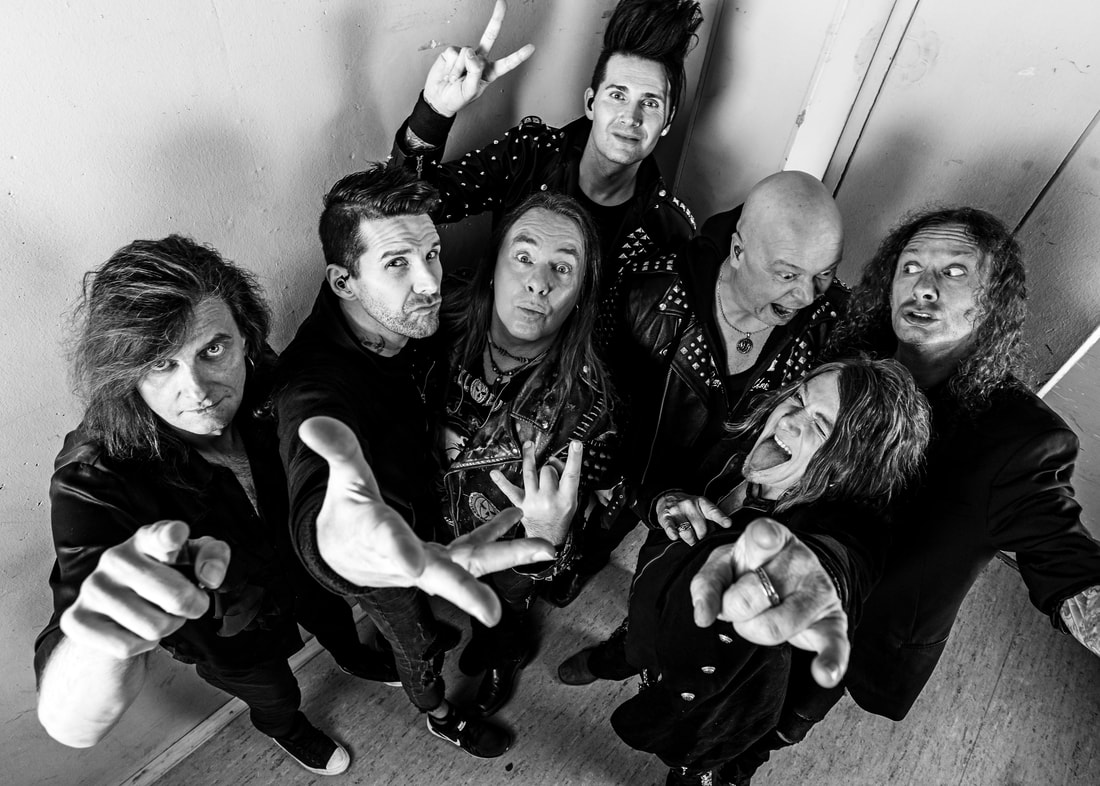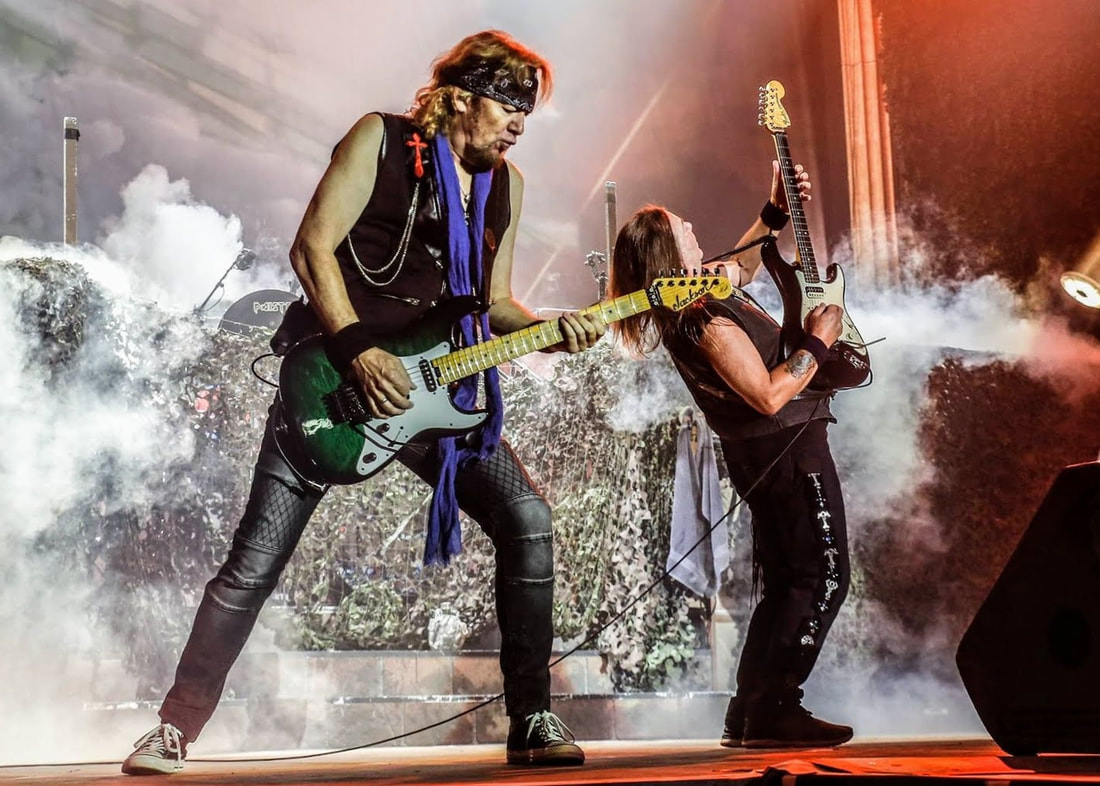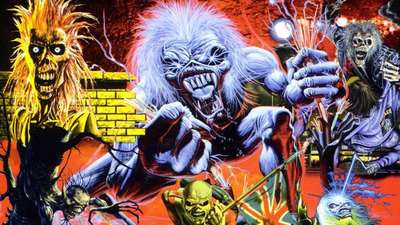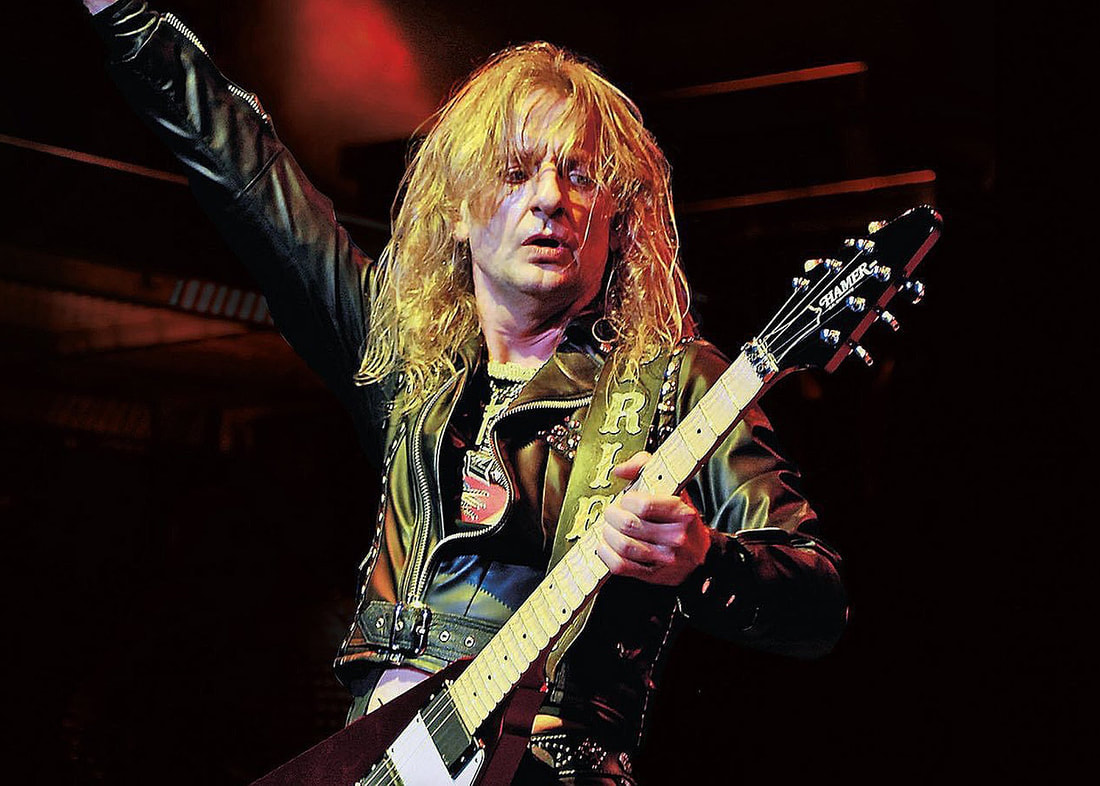|
For a certain generation, Michael Kiske, the man who fronted the ‘Keeper’-era of the band, is the voice of Helloween. For another, it’s founder Kai Hansen. For those who discovered them in the ‘90s, it’s long time singer Andi Deris. Putting the best of all three worlds together, the pumpkins united in 2017, and haven’t looked back since. A successful tour that included a star turn at London’s Brixton Academy, has led to a new album from the seven-strong behemoth; their first to feature Kiske in 28 years, and Hansen in more than three decades. We sat down with Michael for an intimate chat about reuniting with Helloween, the new album, and working with Iron Maiden’s Adrian Smith. A little time; Eamon O’Neill
Hi Michael, how are you today?
I’m very good. It’s just getting very hot! I’m completely out in the fields. I moved out, outside of the city, and it’s all green, it’s all beautiful, but it’s getting over thirty degrees now, so you’re starting to recognise the summer. How does it feel to be able to once again say; “Hi, I’m Michael Kiske, singer of Helloween”? That’s amazing, isn’t it? There was many years – you could say centuries – where I would have refused anything in that direction. In the ‘90s, I didn’t even think that I would ever go on stage again or anything like that. I was frustrated and disappointed, and didn’t want to have anything to do with it. I didn’t even follow the career of Helloween; I refused to listen to anything. Was that because of your experiences in the industry, or because of the way in which the band ended? It was everything. I was disappointed how it went down with the band, and then I got pissed about the metal scene; how something gets treated that is unexpected when you make an album. I mean, it was a learning phase for me. It was important for me. I don’t want to diss any of it; it was very necessary for shaping my own personality. I’m totally fine with that time, but to explain what it was, it was basically a combination of many things. I was also later on, very disappointed about how my solo records got treated; not so much if someone doesn’t like them, but I was very naïve. I was kind of believing it’s all about true music, which is what the metal scene always claims to be about, but it’s not; it’s just as commercial as anything else in the end. So that disappointing reaction to your solo work affected you? I understand it a lot better today, that’s something I have to say. From the fan point of view; they don’t really want to hurt you, they’re just disappointed because they liked something, and then you’re way off of what they would have expected, and then they’re disappointed. In those days, I felt offended, I felt betrayed. Like I said, it was very important, but it was a combination of things. It was not easy, but it was a very important time. Let’s rewind a few years, to how it all kicked off with you re-joining Helloween again. It was many steps, to be honest with you. If you want to go all the way, it started with [supergroup] Avantasia; it started with Toby [Tobias Sammet] taking me into laying vocals down on some of his songs that sounded very Helloween-like. In the beginning I was even saying; “no, I don’t want to do stuff like that anymore”; I was very anti-everything in that direction! But he’s the kind of guy that doesn’t give up that easily, so he was calling me up and he was really talking me into doing it, and I did it just for him because I liked him. That’s why I’m called ‘Ernie’ on that record [‘The Metal Opera’, 2001]; that was my way of dealing with everybody. I laugh about it today too, but that’s the way it was in those days! After that you made a few albums with Place Vendome. Later on Serafino [Perugino] from Frontiers [Records] offered me deals for my solo stuff, and then he came up with Place Vendome, which we made four pretty nice records which was more into the hard rock direction. Then I did this acoustic version of my songs [‘Past in Different Ways’, 2008], which was also a suggestion of Serafino, I must say that, which helped me too. It was kind of making peace, at least with my own stuff and the band. It was Unisonic though that really sowed the seeds for your return to Helloween. Unisonic was the first real band thing. I started touring again with Avantasia, and that was because my manager who also played drums in Unisonic, Kosta [Zafiriou] - he used to be my manager then, and he’s still part of Bottom Row [Promotions] who’s also managing Helloween – he said; “you should do that. You should actually say ‘yes’ to the offer to tour with Avantasia because it gives you a chance to be comfortable again on stage. You haven’t been doing it for so long, and it’s an easy start, it really is”. I always describe it as ‘paid holidays’ really, because you don’t do much; there’s a few spots you sing, and the rest you just enjoy the time. But the first real touring was with Unisonic. You hooked back up with Kai Hansen, originally via Avantasia. Kai was with Avantasia as well on the first tour that I did, which as the second Avantasia tour in general. I refused the first one because I wasn’t ready. He was offering me a lot of money but I said “nah, I don’t want to tour again”. But being on stage again with Kai, it just felt great, and we started talking backstage; “oh we should do something together again”, and I didn’t want to join Gamma Ray, so he joined Unisonic, and that was another step. It was a chance meeting with Michael Weikath however, that eventually led to Helloween coming back together.
Inside of myself, the big game changer was when I ran into Michael at a festival backstage in 2013. There has been years when I probably would have [mimes choking action]. I’m not a violent person, I don’t think I would have done anything like that, but that is what I felt, but I suddenly stood in front of him, and he said those words that sort unarm you right away. He looked at me and he said; “what have I done that you can’t forgive me?” I mean, that’s a line! And I was just holding my breath, and I just noticed there’s no anger any more. So I said; “you know what? I think I’ve forgiven you a long time ago”, which was actually true. It happened over the years, that I kind of subconsciously forgave him for whatever went down, but still there was no talk about Pumpkins Reunited or anything like that. There was nothing like that in my head, but it was interesting for me. So what happened to finally reunite you, Kai and the band? I think it was still another year until I gave that green light for that. That happened, again, with Unisonic. We were playing three shows in Spain, and the band was getting to a point where we actually became a good live band, and it was great fun. After one of those shows, Kai said; “you know what Michael? One day we’ve just got to do something with Helloween”. He wanted to do that a long time, and then I said; “you know what? I’m open for it”. And Kosta was playing drums, and he was mentioning that in the office, and then later on, Jan Bayati who is the manager of Helloween – a great guy, by the way – called me up and checked on me, how serious I was about the idea. What was it that attracted you back to Helloween? My personal reason of being interested was I did not know what to expect. I couldn’t tell how big the band, or had no idea about how successful this would be, come a tour. I didn’t even think about these things. The only thing I had in my mind was getting the negative past out of my system; making peace. It’s different now; now I’m really happy that we’ve continued with this, but in that phase, that wasn’t my main concern at all. I just wanted to make peace. And so did Weiki. Jan said to me; “you’ve got to have a longer talk with Weiki, and you’ve got to check out if you can bury the hatchet”, and so we did. We had a long talk, and it was all fine. It was very interesting because, as usual, everybody has a different story in his head. With Kai also coming back, the line-up would now have three singers; had you any trepidation about coming back in that way? In the beginning I think everybody had concerns. We did everything very carefully. Like I said, I cleared out with Weiki, then I flew over to Tenerife and spent some time with Andi [Deris], who I didn’t know. We needed to figure out if we’d even get along, because if we did not get along it wouldn’t make any sense, but that worked out great. It almost felt like I knew him. I’m a spiritual person; I don’t care about religion, but I believe in the deeper meaning of our existence, and these things are no coincidence, and I felt like I knew him. When that was out of the way, we started the real talks. Of course in the beginning, nobody knew how this is going to end up, so we only made contracts for the tour in 2017, so that if everything did not work out, everybody could go his own way again and we wouldn’t be tied to any contracts. Of course the union lasted longer than that initial tour. It worked out amazingly! Even though it was the hardest tour that I ever did because I caught a freakin’ virus somewhere in South America and I couldn’t get rid of it. Like, after four weeks, like the middle of the tour, I was only able with huge glasses of red wine and painkillers to go on stage because my immune system was going nuts. It was going into my left leg, so I was starting to lean and stuff like that. You shouldn’t do things like that with your health, and I’m certainly not going to do that again, but I didn’t want to cancel anything, so I sort of pulled it through. But even though it was very tough, physically, especially for me, there was no bad feelings, not even a raised voice in any situation. It was perfect. Were you surprised by the reaction to the Pumpkins Reunited tour? When we all discovered; “man, this works!”, you realise the spirit on stage, and the reactions of the audience. I mean, I was surprised about the ticket sales. I wasn’t even informed; maybe Jan does it so our heads don’t grow big or whatever, but he wasn’t saying anything about the ticket sales, and later on when most of the places were sold out, I had a talk with him, and I said something critical; “what if?…”, and he said; “no, don’t worry about it. Ticket sales are amazing". It was already three hundred times more than on any previous tour they did. When you get such a feedback, it kind of changes everything. It took me a while to get it in the picture that there are still many people out there that care about this band. I was so off the scene for so many years, I did not know what to expect. You must be so proud to be singing on your first Helloween album in twenty-eight years!
I’m most proud of how easy it went down. There was no fights. In the early years, in the ‘80s, there was a lot of ego stuff going on; not at all this time. When I did the vocals with Andi together, it was perfect. It was exactly the way it should be. We were just caring about what’s good for the song. I was trying out things, and if I didn’t feel comfortable I passed it onto him; he gave it a try, and the other way around. It was perfect. Your voice sounds so strong; it’s like you recorded your parts the day after finishing the ‘Chameleon’ album in 1993. I think I sound more grown these days. I would love to rerecord ‘Keeper I’, for instance, because I sound like a teenager there – which I was! But I can still sing the shit, that’s true. The production on the album is quite remarkable too. When it comes to the sound, we didn’t want to sound like everyone else today, to a certain extent. We even used the drum kit of Ingo [Schwichtenberg, original drummer who passed away on 8th March, 1995]. We bought it from a fan. A fan started to talk to me when I was shopping in Hamburg, and I talked to him about maybe two hours in front of a market, and he said he’s got the drums of Ingo. He bought it in the ‘90s, and he wanted us to sign the inside of the snare drum, and that was how the connection to that drum kit came. I think Dani [Daniel Lobell, drums] later on had the idea to buy the kit from him and record with it, and it has two great things; one, there’s a little bit of Ingo there; and it sounds different, because the drum kits of the ‘80s don’t sound like the kits today. The release of ‘Helloween’ the album is arguably the biggest event in metal since Iron Maiden released ‘Brave New World’ in 2000. Wow. What’s interesting about statements like that is when you make an album, you don’t know how it’s going to be received. We really refused to set ourselves under any kind of pressure, as much as we can avoid it, to fulfil any expectations other than trying our best to make the best songs. It makes no sense when you try and write in a certain direction. I don’t even think anyone can do that; you have ideas for songs that you work out, and then they are what they are. The album is what it sounds like at the moment when the seven of us make an album, and we are all very happy about how it gets received. It’s global, the reaction; I didn’t hear anything negative, and that’s a mazing. I don’t even remember that we’ve ever had such a positive response, which I also think has to do with time, a little. People are tired of the pandemic, and they’ve waited for something like this to happen for a long time. This combination makes people being so excited and positive about it, and it’s wonderful, it really is. There’s a great mix on the album from the trademark Helloween power metal of ‘Out For Glory’, to more straight ahead metal of ‘Best Time’. I still think we could have used the ballad, and we had one, or we have one. Andi has written a great, great ballad. The way they produced it, during the production they changed it so much that in the end he didn’t like it anymore. They changed the key to a lower key, they used a different kind of instrumentation with a piano and stuff like that. I liked it, but the producers and himself, they were just not so happy with it, so they want to come back next time to the original version and do it the way it was in the beginning. That’s the only thing I think the album could use; not killing any songs, just put that extra ballad on there. Can you tell me the name of the ballad, or is that top secret?! ‘Into the Sun’, I think that’s the name of it. Great, great song. Really, maybe the best sucker that he has written. He’s a great song writer. In my time in the band, we were always pretty diverse; we had these [epics like] ‘Eagle Fly Free’, but we also had [the more straight ahead] ‘I Want Out’, ‘Dr. Stein’; the funny thing like ‘Rise and Fall’ – more humouristic – or ‘Keeper of the Seven Keys’, and we had ‘A Tale That Wasn’t Right’; we had lots of different sounds, and of course now it’s even more, because now you have someone like Sascha [Gerstner, guitarist] who writes his own kind of stuff, you have Andi who has his own kind of song writing, and now Kai and Weiki too. You’ve not been involved in the song writing for ‘Helloween’, which is a little puzzling, given you’ve written the likes of ‘Kids of the Century’.
I intentionally kept myself out of it. I might do something in the future, but I felt like, apart from personal taste and favourites, it’s a matter of fact that the key songs that define the sound of this band and made the main success of the band were written by Kai and Weiki, and later on there was a lot coming from Andi, and also Sascha, so I felt like, I let them do it. I wanted to ask you about what you remembered about writing ‘Kids of the Century’. I remember that, because the guitar riff, it was very natural for me to play, and Weiki, in those days; everything is bad that he couldn’t play! If he couldn’t play it, it “sucked”, musically! There was a big fight to get him to play the riff, because for him, it was not his way of playing. And still, on the album, it’s not the way I had intended. The riff is right, but the groove is not round enough. Are you talking about the main verse riff? That riff. It was a nightmare to get him to play it. Roland [Grapow] was able to play it, he didn’t have that problem, but Weiki had huge problems, and started to bitch against the song because he couldn’t play it. That’s the dude he used to be in those days. He changed a lot. ‘Pink Bubbles Go Ape’ has some unusual cover art. That girl [on the cover] was cute. She was the niece of Storm Thorgerson [designer]. I was young in those years too, but she was something. She was very pretty, and very tempting! Did you meet her on the set of the video for ‘Kids of the Century’? Yeah, that’s where I met her. She was not only on the cover, she was also in the video, right. That album opens with the acoustic title track that you also wrote. Ah, you mean the intro, ‘Pink Bubbles’?! I haven’t heard the record for ages. Now you mention it, it pops up in my mind what you’re talking about! I forgot about that! Yeah, it was a very crazy time, to be honest with you. The record has this title because that’s how we felt. When Kai left the band, the whole balance was gone. As a band, we were just not functioning really anymore. I won’t say that we wrote bad songs – not at all – even on ‘Chameleon’ there were good songs, but we were not a band anymore like we used to be, working together. I mean, on ‘Pink Bubbles’ we still did; on ‘Chameleon’, nothing like that anymore. It was like three guys making solo records under the name ‘Helloween’. I‘m glad you mention ‘Chameleon’, because it gets a harder time than I think it deserves; there are some great songs on there. ‘I Believe’ and ‘Longing’; those are my favourites on the album. It’s not a bad record, and it was very cool recorded. We had the NDR [Elbphilharmonie Orchestra], we had twenty-five people who were playing strings on ‘Longing’, and we had horns; it was not keyboards, it was really played. How do you look back on that time of you exit; did the grunge explosion contribute as well? I luckily left the grunge-era out. I know Nirvana was there in that phase, but it wasn’t the time where it kind of wiped everything else out. After that in the ‘90s, everything else ‘sucked’ apart from that type of music, which I never understood. I like musical changes and stuff, but I don’t like it when one music is supposed to be so cool and all the other bands don’t mean anything anymore. I know that the band struggled a lot in those years surviving – not with the first two records that they’d done after me, but later on when the so-called ‘grunge’ – whatever that is – took over completely. It didn’t have anything to do with the music scene, that’s what I’m trying to say. It was just because Kai leaving the band, and the band balance getting out of control, and then all those legal fights; it’s just not good for a band. It was a very difficult time. Do you think the change was necessary, for the survival of Helloween? When Andi came into the band, it saved the band. He brought into the band what the band needed. The band needed a new focus, and he brought great songs into the band, and as it worked out, they were better then. We were just not a band anymore, for whatever reason, it doesn’t really matter. If one person freaks out and doesn’t want to make music with another person, that’s just the way it is; it’s not fair or whatever, but that was the spirit we’re in, and that shows that we were not really functioning as a band anymore. Since re-joining, you’ve performed some of those Deris-era songs; what are your favourites from the time you were not with the band?
I haven’t listened to everything, and in those years, I couldn’t listen to it, but now, I completely can. I can be completely objective, and I understand why it worked out. I understand why the ‘Master of the Rings’ album was successful, because it does not sound like ‘Keeper’; they did not try to fake that sound, but it sounded like Helloween, somehow. It’s like Van Halen did; they sounded very different, not only vocal-wise with Sammy Hagar, but also the song writing changed. It was new Van Halen, but it was still Van Halen, and that’s pretty much what this band did too. They were able to redefine themselves, and I think that’s why it worked out over the years, and that’s why they never died. What do you like to listen to these days? I privately listen to very silent music these days. The heaviest stuff that I listen to is maybe Foreigner. Actually, that’s not true; I bought the ‘Black Album’ from Metallica as a 5.1 surround high-resolution mix. This is amazing! I buy a lot of super audio CDs. I love a few Irish female singers. I love Cara Dillon – I have everything of her. Apart from that, I mainly listen to classical music. And I rediscovered Billy Joel; I bought the ‘70s stuff of his in surround mixes; that’s the stuff I’m listening to. I wanted to ask you about working with Adrian Smith on your ‘Instant Clarity’ album in 1996; was there a reason that it didn’t go any further? I was just doing solo records. There was never a band or anything like that. It came together as it was an idea of Rod Smallwood [manager], really. He said; “you sit around, don’t know what to do; Adrian sits around, doesn’t know what to do; why don’t you guys get together?”, and we did. I think we did some great songs. It was definitely cool. He’s a very cool guy. But after that, I drifted even more apart. I was doing even more acoustic stuff, so it was never meant to be a permanent thing; it was just something to do in that phase. I remember that he was in my apartment that I was renting in those years, and we were both listening together to the new Iron Maiden record without Bruce [‘The X Factor’, 1995], and we were both confused. It was weird because, I don’t want to say anything bad about the guy [Blaze Bayley], I don’t know the guy, but it felt like the vocals were way too high for what he could sing, even on the album. That’s what it sounded like. That was a bit weird, especially when you’re a Maiden fan; it doesn’t work without Bruce Dickinson, in my opinion. Your name was mentioned around that time as someone who could fill Bruce Dickinson’s shoes; were you tempted? I don’t think that I would fit the band, I mean, just personally, from the guy I am, you know? I fit into a band like Helloween where everybody is kind of insane. Everybody’s so different in this band.; it’s really, really interesting, and it’s a miracle that it works. I love Maiden. I always was a Maiden fan, but I think it’s the most unthankful job that you can do, to join a band where a singer like Bruce, or [Rob] Halford or any of these bands; to join a band like that after a singer’s leaving, I wouldn’t recommend it. You can only lose. It makes no sense, especially when a band has reached a certain level of success. Either stay together, or make a pause; to continue with a different vocalist when you have actually written your history, it’s always weird. You can do that in the very early stages of a band when you’re not that big. On the other side, it works for some bands, and it has worked for Helloween, and it has worked for Van Halen and probably others too, but when you’re a fan of the band, it’s weird. Finally, and bringing things back to the present day, you must be excited for the tour behind the new album, pandemic permitting. Yeah, absolutely. We’re used to having longer breaks; that’s not the problem to have one, two maybe even three years off, there’s nothing that you can’t deal with, but we didn’t want to have a break; we wanted to be on tour last year already. The plan was to release the album late summer last year, and then we wanted to tour at the end of last year, so now everything is pushed back. Yeah, we can’t wait, and it’s going to be great. I don’t like the pandemic of course, but for releasing an album, it’s actually quite good; you don’t have anything to do, and at least you’re doing something now! Something comes out, you get an uplifting feeling, and people can really concentrate on the album. And there will be some time passing by until we tour, so everybody will know the album. For a band in our situation, to do it like that is not such a bad thing, I think. Like this interview? Like us on FaceBook and follow us on Twitter for regular updates & more of the same. Heloween's self-titled new album is available now, via Nuclear Blast. |
|
Helloween
"I fit into a band like Helloween where everybody is kind of insane; it’s really, really interesting, and it’s a miracle that it works". - Michael Kiske
© 2016 - 2024 eonmusic.co.ukContact: [email protected]
|

